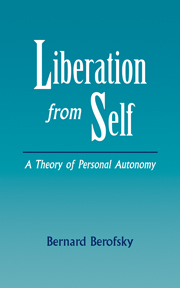Book contents
- Frontmatter
- Contents
- Liberation from self
- 1 Introduction
- 2 Freedom and autonomy
- 3 Freedom of action
- 4 Agent freedom
- 5 Values and the self
- 6 Autonomy and rationality
- 7 Rationality, values, and integrity
- 8 The liberation theory of autonomy: Objectivity
- 9 The liberation theory of autonomy: The place of self
- 10 The value of autonomy
- Notes
- Bibliography
- Index
7 - Rationality, values, and integrity
Published online by Cambridge University Press: 16 September 2009
- Frontmatter
- Contents
- Liberation from self
- 1 Introduction
- 2 Freedom and autonomy
- 3 Freedom of action
- 4 Agent freedom
- 5 Values and the self
- 6 Autonomy and rationality
- 7 Rationality, values, and integrity
- 8 The liberation theory of autonomy: Objectivity
- 9 The liberation theory of autonomy: The place of self
- 10 The value of autonomy
- Notes
- Bibliography
- Index
Summary
We turn finally to the role of values in rational decision making.
It is well known that theorists disagree on the principles a rational agent must invoke when making decisions under uncertainty. One might try to assimilate such situations to ones of decision making under risk and recommend the maximization of expected utility, or one might invoke minimax, maximax, Hurwicz's variant of the latter, or the strategy of minimizing maximum regret. It is commonly supposed that reason per se does not dictate this decision, in which case rational agents are obliged to adopt principles grounded extrarationally. If some such principles are associated with values, then rational agents, all of whom must confront decision making under uncertainty at one time or another, must have values, although these values cannot be derived from the assumption of rationality.
Now the term “value” is used so widely that even these general methodological principles may be said to reflect values. The maximin rule expresses the value of conservatism or caution, the maximax rule that of optimism. If the term “value” is to be stretched this far, it is indeed impossible for any but the most seriously disturbed psychotics to proceed through life without values. The thesis we would then be examining would be reduced to triviality.
- Type
- Chapter
- Information
- Liberation from SelfA Theory of Personal Autonomy, pp. 140 - 181Publisher: Cambridge University PressPrint publication year: 1995



